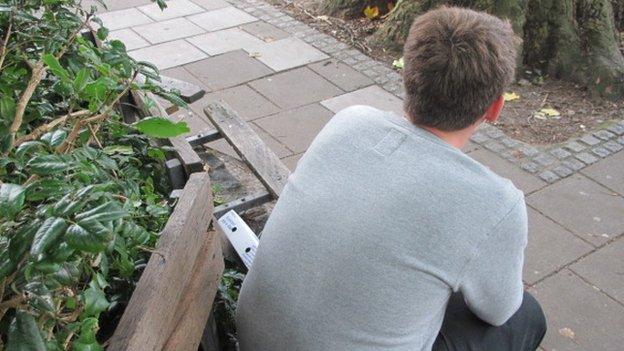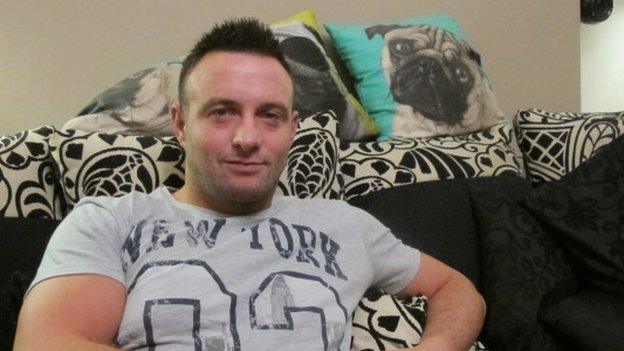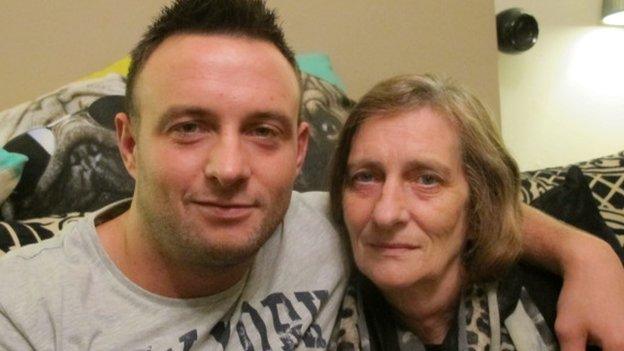K bladder: The UK's secret ketamine epidemic
- Published

K bladder, caused by excessive ketamine use, is a bigger problem in the UK than anywhere else in Europe, according to the country's leading expert.
Mr David Gillatt, a urologist, told Newsbeat it has led to some young people having their bladders removed.
"Physical damage due to ketamine is almost unknown in the rest of Europe and large parts of the world even though it is used as a club drug," he said.
"It's a vicious cycle for some people."

David Gillatt told Newsbeat symptoms of bladder damage can occur after "one or two doses" of the drug
He added: "Unless you help them break the cycle and deal with the pain, they will never come off it.
"Some people are going to turn up in the future with kidney failure too because they have been damaging themselves for so long and not doing anything about it."
The most recent MixMag global drugs survey suggests, external that the UK has more ketamine users than the rest of Europe.
These problems were so severe for one young user that he tried to take his own life. He's been asked to be known simply as Matt from Bristol.
He then developed a heroin addiction, he says, to ease the pain.
Matt told us that ketamine is "an evil drug that strips you down physically."
He explained how he began taking it with friends at clubs and free parties in the city but it soon "got hold of him".
"Everyone around me started getting stomach cramps and getting really ill and peeing blood," he said.
"All the other drugs pretty much went out of the window. It just became a constant wanting to escape.
"I hated being me. I think I was trying to kill myself without actually giving up."
The number of people getting treatment for ketamine-related issues in England has doubled in the past five years according to official figures from the National Drug Treatment Monitoring System.

Matt describes ketamine as an evil drug that strips you down physically
Matt developed K bladder after taking as much as 15g of the drug a day.
K bladder is when the lining of the bladder gets so damaged and scarred that it shrinks in volume, which causes the person to need the toilet more.
Sometimes they can't go, leaving them in excruciating pain.
'Woke up on the bathroom floor covered in blood'
Matt said the pain got so bad for him that he "woke up on the bathroom floor covered in blood, fitting because the pain had got so bad".
He added: "I eventually got into heroin because it was the only thing that got anywhere near to easing the pain that ketamine caused."
Newsbeat has spoken to another ketamine addict who said the damage was so bad he was rushed to hospital because his bladder was blocked and he was passing lumps of blood.

Jamie lost "five or six stone" during is ketamine addiction
Jamie is 29 and a plumber from Wakefield. He said at the height of his addiction, he was taking it for 23 hours a day.
He racked up a debt of £41,000 after spending £80,000 pounds on the drug.
"At one point I couldn't actually pee because my blood was clotted. I actually thought my bladder was going to explode," he said.
"It was the worst pain I have ever had. I never want to feel that again. I thought I was going to lose my bladder."
'Nice to have him back'
For some, the only solution to K bladder is surgery and in some cases this means the removal of the bladder.
David Gillatt said some young users are storing up problems for the future and could develop kidney failure, which could lead to dialysis and even a kidney transplant.
He told Newsbeat: "Research we've done and surveys show there's a relationship between how much you take and how long."
"If you're taking it every day and you're taking large amounts; three, four, five, six grams a day then almost everybody's got problems."
Both Matt and Jamie have been through rehab and are slowly getting their lives back on track.

Jamie and his mother Sue
Jamie's mum Sue told Newsbeat: "I know now that I have got my son back, because I used to say 'You're not my son when you take ketamine'.
"It's nice to have him back."
If you need help with any of the issues mentioned in this article you can get help from Talk to Frank, external.
Follow @BBCNewsbeat, external on Twitter and Radio1Newsbeat, external on YouTube